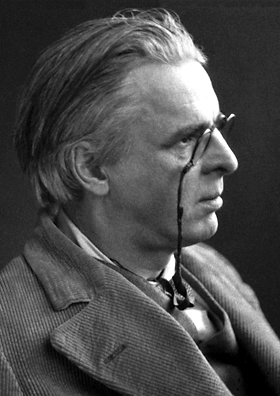William
Butler Yeats is widely considered to have been one of the foremost literary
figures of the 20th century. In 1923, he was awarded the Nobel Prize in
Literature. The scholarly cottage industry around this man must be immense!
However, are we to believe Susan Johnston Graf, for a long period scholars
tended to hush up the Irish poet's most important trait.
Yeats was, gulp, an occultist...
Nor was his occultism a peripheral part of his life. Johnston Graf argues persuasively that Yeats' belief in a spiritual world and the possibility of communicating with it through ritual magic or mediumship formed the real centre stage of his many activities and interests. Indeed, Yeats believed that poetic inspiration is daimonic and comes from attracting supernatural entities. Even his marriage arrangements were connected to a magical worldview, with Yeats' young bride George Hyde Lees being his partner in sex magic. Johnston Graf believes that Yeats and George attempted to sire a new avatar for the coming aeon!
It's no secret that Yeats had been involved in the Hermetic Order of the Golden Dawn, a British society for the study and practice of occultism. Indeed, he was the Imperator of the order's Isis-Urania Temple in London! He was also involved in Stella Matutina, one of several splits from the Golden Dawn. However, after the scandals surrounding Aleister Crowley, Yeats began to play down his esoteric interests - at least in public. Another factor was the hostility of the emerging "modernists" to occult notions, one of the hostiles being American poet Ezra Pound, who served as Yeats' personal secretary. Apparently, modern scholars have seized on this occultation of the occult with a sigh of relief, since it makes it possible for them, too, to stop bothering about the matter. Johnston Graf's book is an attempt to set the record straight. Strangely, she hardly mentions Yeats' tenure as an Irish senator, which surely must have influenced his decision to look as outwardly respectable as possible. After all, senators of the Free State weren't supposed to sire pagan avatars through sexual magic. I gather they were controversial enough if Protestant!
It seems that the esoteric pursuits of many well-known figures have been played down (or swept under the rug) by the scholarly establishment. Robert Zimmer claims in his book "Clairvoyant Wordsworth" that the British poet William Wordsworth has suffered such a fate. Other examples that come to mind are Schelling (see my review of "Schelling and Swedenborg") and Isaac Newton. When Johnston Graf was a student pursuing a degree in Yeats studies, she too was forced to constantly de-emphasize the occult symbolism of various Yeats poems. On a funnier note, her teachers were also uneasy about Yeats' mysterious "Steinach procedure", apparently taking seriously a rumour that the aging poet had his testicles removed and replaced with those of an ape or monkey! This was something to be hushed up, since it would impinge on the character of this universal genius... (In reality, the procedure was a vasectomy.)
"W. B. Yeats: Twentieth-Century Magus" is a book that speaks for itself. Don't read it, unless you are ready for a procedure involving qabalah, magick, daimons, séances, avatars of the New Age, automatic writing and the quest for an Anti-Self bestowing the muses onto adepts with appropriate magical masks...
Demon est Deus inversus, yes?

No comments:
Post a Comment